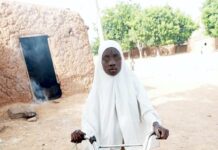In the heart of Kano State, a silent crisis unfolds behind closed doors, challenging the very fabric of homes meant to be sanctuaries. Abdulhamid Abdullahi Aliyu unravels the profound impact of domestic violence, sharing the harrowing stories of survivors who courageously navigate the treacherous journey to freedom in Kano State.
Aisha’s journey, reminiscent of countless young women’s dreams, took a disconcerting turn after marrying Abdullahi Bello. Initially, their union seemed idyllic, but Abdullahi’s shift towards controlling and violent behavior shattered the illusion. Aisha, a skilled fashion designer, found herself trapped in a cycle of fear and abuse, enduring beatings and emotional torment for 13 agonizing years.
Her attempt to escape the clutches of her abusive marriage was met with relentless pursuit by Abdullahi, perpetuating a vicious cycle that extended beyond legal interventions. Aisha’s children, witnessing the turmoil, bore the scars of their father’s violence. A heart-wrenching revelation emerged – her son, Joshua, battling depression, attempted suicide on two occasions, laying bare the devastating impact of domestic violence on children.
In a society where one in three women faces physical or sexual violence, according to the World Health Organization, Kano State grapples with its share of this pervasive issue. The Nigerian National Bureau of Statistics revealed alarming figures, with 30% of women aged 15-49 experiencing physical violence, and an astonishing 68% encountering emotional, economic, or sexual abuse.
The Executive Secretary of the Lagos Domestic and Sexual Violence Agency, Mrs. Titilola Vivour-Adeniyi, disclosed that 93% of reported domestic violence cases in Kano State are initiated by women. Verbal, emotional, and physical abuse constitute these cases, painting a stark picture of the urgent need for intervention and support.
Esther Abiola’s story, though unfolding in a different context, echoes the resilient spirit of survivors in Kano State. A confident and independent woman shattered by trauma, Esther’s life took a tumultuous turn after a traumatic incident. Her ex-husband’s controlling demeanor led her into an abusive marriage, where isolation and manipulation became the norm.
Finding solace in prayer, counseling, and supportive friendships, Esther embarked on a healing journey that transformed her into an author and the founder of the Esther Life Kingdom Foundation. This non-governmental organization offers critical support, including counseling and legal assistance, to women escaping abusive relationships, exemplifying the strength that can emerge from adversity.
Read Also:
As stories like Aisha’s and Esther’s reverberate, the need to address gender-based violence in Kano State becomes increasingly urgent. Dr. Samuel Aladejare, a Senior Registrar in Psychiatry, emphasizes the profound impact on mental health, with survivors facing an increased risk of perpetrating violence or even suicide.
To combat this crisis, Dr. Aladejare calls for economic empowerment, policy inclusion, and the implementation of the Violence Against Persons (Prohibition) Act 2015 in Kano State. The destigmatization of gender-based violence, integration of prevention measures, and funding for dedicated rehabilitation programs stand out as imperative steps.
Survivors’ paths to healing involve cognitive behavioral therapy, group therapy, and supportive therapy, reflecting the broader need for mental health support. The societal impact of gender-based violence extends far beyond individual survivors, affecting families and communities at large.
In Kano State, initiatives promoting awareness and education about healthy relationships become paramount. Schools, community centers, and religious institutions can play pivotal roles in fostering a culture of respect, empathy, and open communication. Collaboration with local leaders and influencers amplifies the message, reaching individuals who may be unaware of the resources available to them.
Beyond legal interventions, creating safe spaces for survivors and their families is essential. Support groups, facilitated by mental health professionals, provide avenues for sharing experiences, coping strategies, and collective healing. These spaces also counter the isolation often felt by survivors, reinforcing the idea that they are not alone in their struggles.
As the community mobilizes against gender-based violence in Kano State, the role of men in this narrative becomes crucial. Engaging men as allies in the fight against abuse dismantles harmful stereotypes and fosters a sense of shared responsibility. Educational programs targeted at men, focused on empathy, communication skills, and breaking the cycle of violence, contribute to long-term societal change.
A multi-faceted approach, encompassing legal, social, and educational components, is imperative in addressing the deep-rooted issue of gender-based violence. Kano State has the potential to emerge as a beacon of change, showcasing how a united community can eradicate the shadows that linger within homes and communities.
In conclusion, the battle against gender-based violence in Kano State demands collective action, compassion, and sustained efforts. It requires a commitment from individuals, communities, and policymakers to foster an environment where every person, regardless of gender, can live free from fear, violence, and the shackles of abuse. As these stories unfold and resilience takes center stage, the hope for a brighter, safer future in Kano State becomes a shared aspiration.
Abdulhamid Abdullahi Aliyu

























